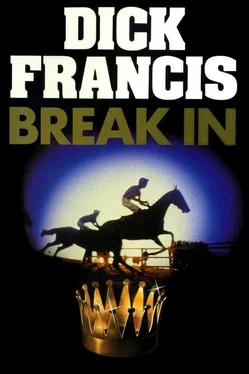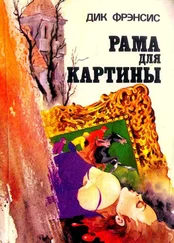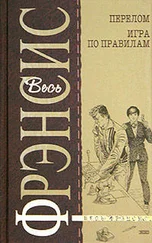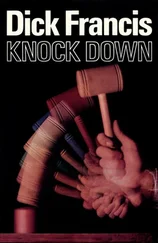Aunt Casilia, Danielle said, was looking forward to tomorrow’s lunch party and hoped I would be there.
‘Will you be going?’ I asked.
‘Nope. Aunt Casilia would have gotten me invited, but I’ve a college friend passing through London. We’re having lunch. Long time date, I can’t break it.’
‘Pity.’
‘You’re going? Shall I tell her?’
I nodded. ‘I’m schooling some of her horses in the morning, and I’ll be coming along after.’
Joe came out finally, stretching his backbone and flexing his fingers.
‘Come on, then,’ he said. ‘Come and see.’
We all went, the station chief as well, sitting in chairs collected from adjoining rooms. Joe started his machine, and there, immediately, was the uncut version of the television interview of Maynard and his tormentor, followed by the list of firms Maynard had acquired. At the end of that the tape returned to repeat the interviewer’s outline of Metavane’s story, and then came my voice, superimposed on views of horses exercising on Newmarket Heath, explaining who Major and Mrs Perryside were, and where they now lived.
The Perrysides appeared in entirety, poignant and brave; and at the end the tape returned to the television interviewer again repeating the takeover list. This time it stopped after the mention of Purfleet Electronics, and then, over a view of mudflats in the Thames estuary, my voice introduced George Tarker. The whole of that interview was there also, and when he said in tears about his son wiring himself up, Danielle’s own eyes filled..
Joe left the shot of George Tarker’s ravaged face running as long as I’d taped it, and then there was my voice again, this time over a printing press in full production, explaining that the next person to appear would be the son of Lord Vaughnley, who owned the Daily and Sunday Towncrier newspapers.
All of Hugh’s tape was there, ending with his impassioned plea to come home. On the screen after that came a long shot taken from the cut televised version of How’s Trade, of Maynard smiling and looking noble. The sound track of that had been erased, so that one saw him in silence. Then the screen went silently into solid black for about ten seconds before reverting to snow and background crackle.
Even though I’d recorded three of the main segments myself, the total effect was overpowering. Run together they were a punch to the brain, emotional, damning the wicked.
The station chief said, ‘Christ’, and Danielle blew her nose.
‘It runs for one hour, thirteen minutes,’ Joe said to me, ‘if you’re interested.’
‘I can’t thank you enough.’
‘I hope the bastard burns,’ he said.
In the morning I went to Wykeham’s place south of London and on the Downs there spent two profitable hours teaching his absolute novices how to jump and refreshing the memories of others. We gave the one who had fallen at Ascot a pop to help him get his confidence back after being brought down, and talked about the runners for the rest of that week.
‘Thank you for coming,’ he said. ‘Good of you.’
‘A pleasure.’
‘Goodbye P... er... Kit.’
‘Goodbye Wykeham,’ I said.
I went back to London, showered, dressed in grey suit, white shirt, quiet tie, presenting a civilised face to the sponsors.
I put one of the six copies Joe had made of the Allardeck production into a large envelope, sticking it shut, and then zipped a second of them into the big inside pocket of my blue anorak. The other four I took downstairs and lodged in the hotel vault, and carrying both the envelope and the anorak went by taxi to Eric Olderjohn’s terrace house behind Sloane Square.
The taxi waited while I rang the bell beside the green door, and not much to my surprise there was no one at home. I wrote on the envelope: ‘Mr Olderjohn, Please give this to a Certain Person, for his eyes only. Regards, Kit Fielding’ and pushed it through the letter-box.
‘Right,’ I said to the taxi driver. ‘The Guineas restaurant, Curzon Street.’
The Guineas, where I’d been several times before, was principally a collection of private dining rooms of various sizes, chiefly used for private parties such as the one I was bound for. Opulent and discreet, it went in for dark green flocked wallpaper, gilded cherubs and waiters in gloves. Every time I had been there, there had been noisettes of lamb.
I left my anorak in the cloakroom downstairs and put the ticket in my pocket, walked up the broad stairs to the next floor, turned right, went down a passage and ended, as directed, at the sponsors’ party in the One Thousand Room.
The sponsors greeted me effusively. ‘Come in, come in. Have some champagne.’ They gave me a glass.
The princess was there, dressed in a cream silk suit with gold and citrines, dark hair piled high, smiling.
‘I’m so pleased you’ve come,’ she said, shaking my hand.
‘I wouldn’t have missed it.’
‘How are my horses? How is Icefall? How is my poor Allegheny? Did you know that Lord Vaughnley is here?’
‘Is he?’
I looked around. There were about thirty people present, more perhaps than I’d expected. From across the room Lady Vaughnley saw me, and waved.
‘The Towncrier joined forces with the Icefall people,’ the princess said. ‘It’s a double party, now.’
The Icefall sponsors came to bear her away. ‘Do come... may I present...’
Lord Vaughnley approached, looking blander than bland.
‘Now, everybody,’ said one of the sponsors loudly, ‘we’re all going into another room to see films of our two races, both won by our most honoured guest, Princess Casilia.’
There was a little light applause, and everyone began to move to the door. Lord Vaughnley stood at my elbow. The princess looked back. ‘You’re coming, Kit?’
‘In a minute,’ Lord Vaughnley said. ‘Just want to ask him something.’
The princess smiled and nodded and went on. Lord Vaughnley shepherded everyone out, and when the room was empty, closed the door and stood with his back to it.
‘I wanted to reach you,’ I said; but I don’t think he heard. He was looking towards a second door, set in a side wall.
The door opened, and two people came through it.
Nestor Pollgate.
Jay Erskine.
Pollgate looked satisfied and Jay Erskine was smirking.
‘Neatly done,’ Pollgate said to Lord Vaughnley.
‘It worked out well,’ he replied, his big head nodding.
He still stood four-square in front of the door. Erskine stood similarly, with folded arms, in front of the other.
There were chairs and tables round the green walls, tables with white cloths bearing bowls of nuts and cigarette-filled ashtrays. Champagne goblets all over the place, some still with bubble contents. There would be waiters, I thought, coming to clear the rubble.
‘We won’t be disturbed,’ Pollgate told Lord Vaughnley. ‘The “do not enter” signs are on both doors, and Mario says we have the room for an hour.’
‘The lunch will be before that,’ Lord Vaughnley said. ‘The films take half an hour, no more.’
‘He’s not going to the lunch,’ Pollgate said, meaning me.
‘Er, no, perhaps not. But I should be there.’
I thought numbly: catch me first.
It had taken five days... and the princess.
‘You are going to give us,’ Pollgate said to me directly, ‘The wire-tap and my journalists’ belongings. And that will be the end of it.’
The power of the man was such that the words themselves were a threat. What would happen if I didn’t comply wasn’t mentioned. My compliance was assumed; no discussion.
He walked over to Jay Erskine, producing a flat box from a pocket and taking Jay Erskine’s place guarding the door.
Читать дальше




